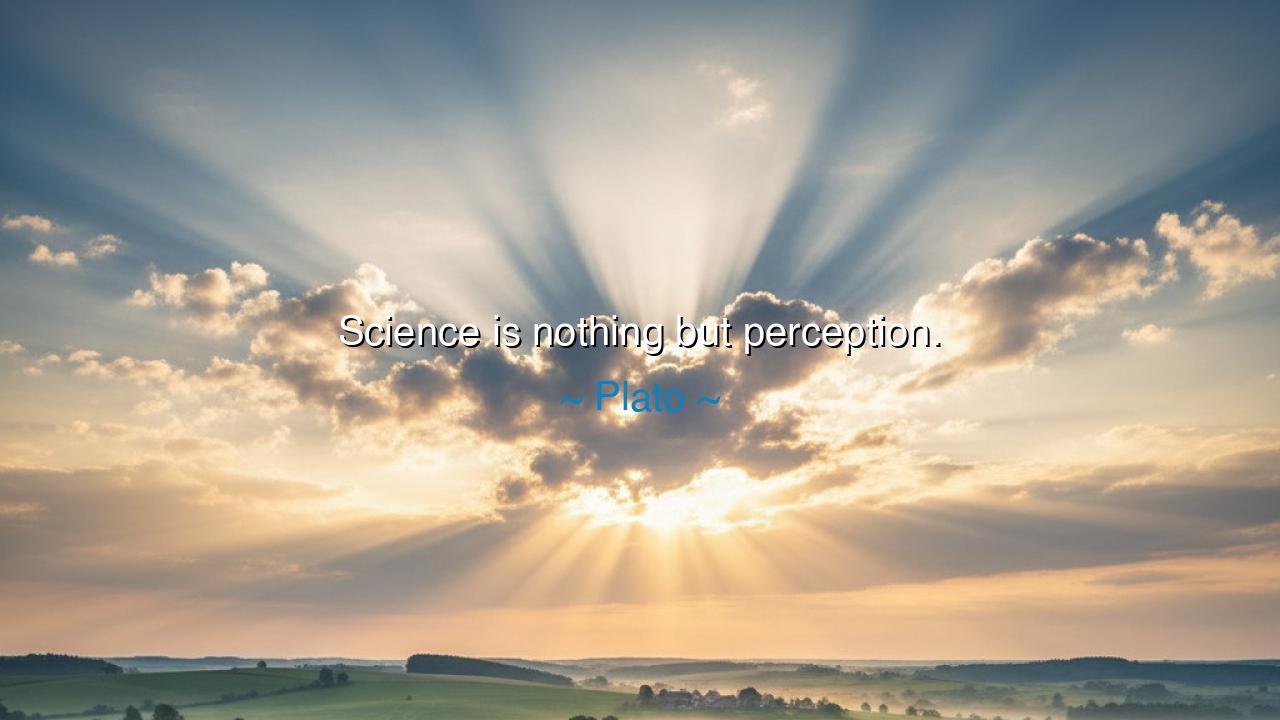
Science is nothing but perception.






Plato, the ancient master of wisdom, once declared: “Science is nothing but perception.” These words strike the heart like a riddle wrapped in fire. For in them lies a truth that unsettles and enlightens: what we call knowledge, what we name as fact, is born from the frailty of the senses and the shaping of the mind. Perception is the gateway through which all knowledge enters. Without the eyes, without the ears, without the touch of the hand and the reasoning of the soul, there would be no science. It is not carved in the heavens, waiting to be plucked whole—it is woven through human experience, fragile yet luminous.
The ancients wrestled long with this mystery. In his dialogues, Plato taught of shadows on the cave wall—mere perceptions mistaken for reality. Yet he also acknowledged that perception was the first step toward wisdom, the spark that draws the mind upward toward truth. Science, in his day, was not the mechanistic pursuit we know, but the philosophy of nature—the attempt to reconcile what we perceive with what we reason. To say that science is perception is to say that it begins always with the human act of seeing, hearing, touching, and then interpreting what is seen.
Consider the story of the early astronomers. To the naked eye, the sun appeared to circle the earth, and the stars wheeled overhead like lamps hung upon a dome. This was perception, and for centuries it formed the foundation of belief. Yet new perceptions—Galileo’s telescope, Kepler’s measurements—revealed another truth: that the earth itself moved, that our perceptions, though powerful, were limited. Plato’s wisdom warns us not to scorn perception, but to understand its dual nature: it is both the seed of knowledge and the veil that hides the deeper truth.
History gives us many such lessons. Think of Louis Pasteur, who looked at disease not merely through the eyes of habit but through the lens of the microscope. Others perceived sickness as curses or imbalances of humors. Pasteur’s perception was deeper, sharper, guided by curiosity and humility. In the tiny forms of bacteria he found truth, and from that perception was born the science of modern medicine. Thus, perception is not fixed; it can be sharpened, expanded, refined, until what once seemed invisible becomes the very key to life.
And yet, Plato’s words are also a warning. If science is nothing but perception, then it is never final, never absolute. Our senses deceive, our minds misinterpret. To cling too tightly to what we perceive as ultimate truth is to risk error and arrogance. Science must walk always in humility, remembering that what it knows today may be overturned by the deeper perception of tomorrow. Thus, the wise do not cling to their knowledge as idols but treat it as steps upon an endless ascent.
For us, the lesson is clear. In our daily lives, we must not dismiss our perceptions, but neither must we worship them. We should strive to refine them, to question them, to test them. When we perceive injustice, let us not ignore it. When we perceive beauty, let us cherish it. When we perceive truth, let us seek to confirm it with reason and with humility. In this balance, we live as both philosophers and scientists.
So I say to you: honor the gift of perception, for it is the root of all knowledge. But also honor the path beyond it, the discipline of questioning, testing, and seeking. Plato’s wisdom endures, whispering across the ages: science is nothing but perception, and perception, if refined by wisdom, leads us from shadows into light. Walk this path, and you will not only see the world—you will begin to understand it.






AAdministratorAdministrator
Welcome, honored guests. Please leave a comment, we will respond soon